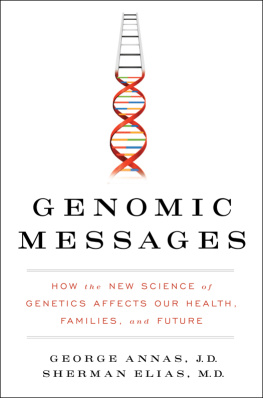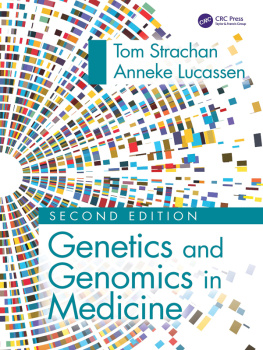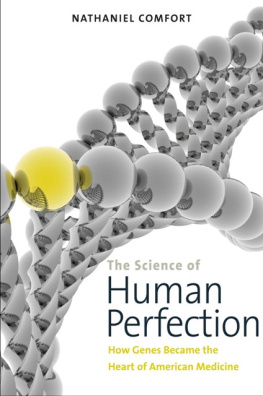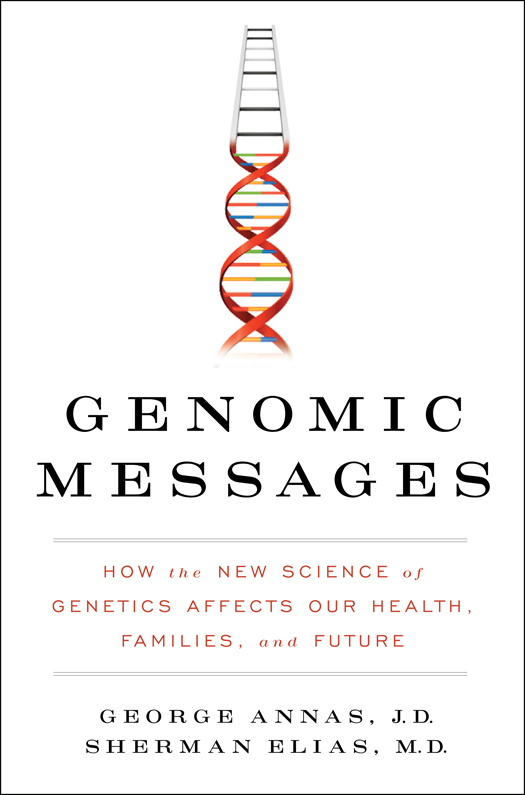To our grandchildren
Contents
Guide
G enomics has captured the attention of presidents and physicians, of science enthusiasts and health-conscious Americans. Genomic Messages is about what your genome, as read and interpreted by a skilled geneticist, can tell you about your health and your familys health, today and in the near future. Genomics will change how we think about ourselves and our fellow humans, and is powerful enough that it could transform American medicine in the coming decades. Because of its transformational potential, it is critical that the evolving science of genomics is introduced into medical care in a way that makes the health system better and more responsive to patients, improves communication and the physician-patient relationship, improves overall health, and contains cost, all the while avoiding the past pitfalls of the old genetics: eugenics, stigmatization, and discrimination. Thats a big order!
A genomics that improves our medical care and our lives is only possible if we as citizens, consumers, and patients all critically engage with the science of genomics. Critical engagement is possible because genomics can and should be made accessible to non-specialists and the lay public. It is also a good time for public engagement because genomics has so far been actively introduced into clinical medicine primarily in two areas: prenatal screening and cancer research. Cancer research is also at the core of the genomic medicine initiative which President Obama announced in his 2015 State of the Union address, relabeling personalized medicine, precision medicine. As the president later put it, jump-starting genomic research with new federal funding is one of his few budget proposals that has strong bipartisan support. A major component of the presidents new genomic initiative is the planned construction of a massive DNA data bank with a million Americans sharing their personal, medical, and genomic information. This data bank can only be built and used, the president underscored, if the privacy of the participants can be credibly protected. Four of the ten chapters of this book specifically address each of these areas: precision (genomic) medicine, prenatal screening, cancer treatment, and genomic privacy. The other six are interconnected: the nature of genomic information, nature and nurture, pharmacogenomics, reprogenomics, children, and genomics future. One of the themes of this book is that the coming flood of genomic information is likely to make at least some of your medical treatment more precise and personalized, but this flood of genomic information will also bring you and your physician new levels of uncertainty. The clich is true: we do not know the future, and even with genomics we can no more predict our future health with certainty than we can predict the weather, or even the next terrorist attack.
We are a health lawyer-bioethicist (George) and an obstetrician-gynecologist-geneticist (Sherman) team who have worked together on the clinical aspects of genomics for more than three decades, during which we have published academic books and articles, participated in national and international clinical and legal programs, and worked together on ethics panels. Our working partnership is unusual. Physicians routinely see lawyers as predators, and themselves as their prey. On the contrary, our work together has reinforced our view that cooperation between medicine and law, and genomics and society, is an essential ingredient for progress. Only a genomic medicine that accounts for the values and concerns of the public and patients, is likely to produce useful, accessible, and affordable innovations that can improve your life and health. Genomic Messages contains many stories of real patients. These stories are from Shermans own patients (with identities masked), cases published in the medical literature, and celebrity patients who have made their own stories public.
When we began Genomic Messages, Sherman had no reason to even suspect that he might not live to see it published. But shortly after the manuscript was completed, Sherman died. His ideas, of course, live on in this book, and in the lives of his family, colleagues, and the patients he cared for. George dedicates Genomic Messages to Sherman; but Sherman and George had agreed to dedicate this book to the future: to our grandchildren.
The replication of DNA is a copying of information.
The manufacture of proteins is a transfer of
information: the sending of a message.
James Gleick, The Information (2011)
W e are surrounded by genomic messages much the way fish are surrounded by water. Like fish, we pay little or no conscious attention to these messages. Our bodies, nonetheless, are constantly interpreting the messages, and the way our genes interact with each other and our environment determines the state of our health. These messages are contained in the most remarkable molecule in naturedeoxyribonucleic acid, or DNA. DNA contains the instructions for human development, survival, and physiologic functions, as well as ensuring that our biological information will be passed to our children and future generations.
Some genomic messages are visible on the surface of our bodies, including facial structure, skin color, and height. Other messages predispose us to illnesses that might be translated into diseases later in our lives. Genomic messages can also be read from DNA samples taken from fetuses and newborn babies. Whether translated, mistranslated, or ignored, our DNA and the messages we derive from it will affect (together with our environment) how we live and how we die, as well as the health and future of our siblings, children, and grandchildren. Some of us will live long, others of us will die young; some of us will develop colon or breast cancer, others will not; some of us will suffer from premature dementia, others will age with minds fully functional. Of course, the probability of death is still 100 percent for us humans. But we may be able to lengthen our lives and improve their quality, and those are worthy goals for medicine. The good news is that we may be able to prevent or treat some diseases by reading the genomic messages in our DNA. For the immediate future, however, we will only be able to probabilistically predict, but not prevent, most diseases.
This book will help you make your own decisions about whether and how to use the evolving genomics in your own life. To the extent that health insurance companies, the government, and even your employers think that genomics can save them money, they are likely to pressure you to use the new genomics. Also, to the extent that private corporations believe they can make money by getting you to use the new genomics, you will be subjected to commercials every bit as pervasive as current prescription drug advertising on TV. In this book we will tell you what we think and why, but we will strive to be as objective as we can to help you decide whether to embrace or reject invitations to genomic interventions. Our goal is to enable you to be a more informed and critical consumer of the evolving world of genomics that will invariably affect you, your family, and your ethnic community, perhaps profoundly.









